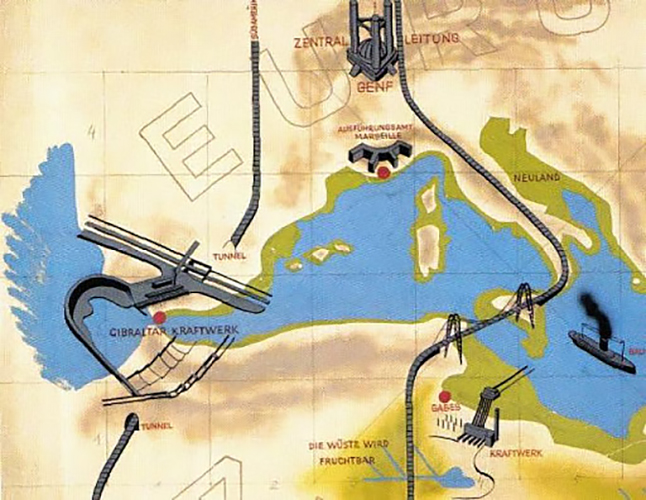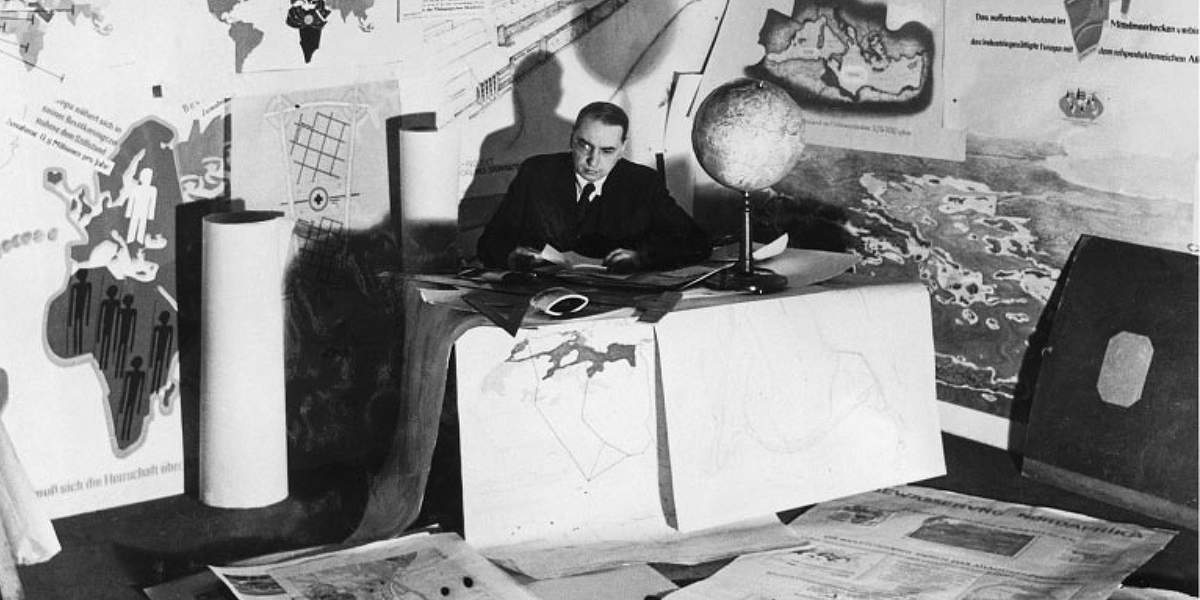
Last time I wrote about the project of global climate change of the planet by Peter Borisov . But in fairness, such large-scale and, at first glance, exotic projects were born not only of Soviet scientists. For example, before World War II, the idea of draining a large part of the Mediterranean Sea was voiced in Europe. Details are under the cut.
Many have heard about the project of turning Siberian rivers for the needs of the national economy of the USSR. And that this idea was abandoned, since the “cost of the issue” (both in the form of implementation costs and in the form of environmental consequences from it) turned out to be too high. But this was not the only project of a global redesign of the world map in the history of the 20th century. And today we bring to your attention a story about a man who proposed to drain the Mediterranean Sea.
His name was Herman Zörgel... In 1927 this German architect came up with the futuristic Atlantrop project. In the decades between the two world wars, global construction projects were generally popular, which were supposed to demonstrate the power of the states that implemented them. Albert Speer inspired the leadership of the Third Reich with plans to rebuild Berlin, which they considered the future capital of the "new world". And in Moscow a huge Palace of Soviets was being erected - a symbol of the first "workers 'and peasants' state".

Herman Zörgel
But Herman Zörgel went further and proposed to connect the European part of Eurasia with Africa, to make the Sahara fruitful, and also to create a system of hydroelectric power plants that provide electricity to all of Europe. The project was co-authored by two scientists - Alexander Gallant and Wolfgang Voigt .
Another dam in the Dardanelles was supposed to separate the Mediterranean from the Black Sea. And the third, between Sicily and Tunisia, was supposed to divide it into two parts. As a result, the water level was expected to drop by 100 meters in the western part and 200 meters in the eastern part. The area of the sea would thus decrease by twenty percent (more than half a million square kilometers), and the Europeans would receive new land for settlement and cheap electricity (from a cascade of hydroelectric power stations on the constructed dams). The implementation of this project, Zörgel believed, would take about a hundred years and lead to the emergence of a new continent - Atlantropa.
Zörgel's project had supporters, but their circle consisted mainly of architects, engineers and some politicians of the Nordic countries. This is not surprising, since a detailed study of the project by experts revealed much more minuses than pluses .
First, they noted, the drained area would be a lifeless desert, covered with large amounts of salt, and even one of the hottest on the planet. That is, for the settlers, even survival on the "lands of Atlantropa" would become a big problem, not to mention any kind of economic activity.
At the same time, the coastal infrastructure of two dozen states with access to the Mediterranean would also suffer. Not only was their well-developed port infrastructure becoming unnecessary, along with world-famous resorts, but agriculture was also threatened.
It is one thing to grow crops on the seashore, and another thing to grow crops on the edge of the salt desert. In fact, the economies of these countries would be destroyed, which would in no way be compensated by the decline in electricity prices.
Another obvious weakness of the project stemmed from its scale. The world at that time did not produce as much concrete as would be required to build only one dam in the Strait of Gibraltar. But this was only part of a grandiose construction. In general, its conduct would require the consolidated work of all European countries for a century (including those for whom it was suicidal). Neither now, nor, even more so then, can one count on such long-term and close cooperation between the world powers. This means that such projects become excessively risky both from a political and economic point of view.
There were other, less obvious, but no less threatening consequences. Drainage of the sea should have caused an increase in the water level in the oceans. Hence, a number of important economic centers all over the planet from Amsterdam to New Orleans were threatened with flooding.
And in terms of climate, the emergence of a huge salt desert between Europe and Africa, and no one undertook to predict, but nothing good was expected.
After 1945, another "weak point" became apparent: in the event of World War III, the Atlantropa dams became an obvious target for bombing. To destroy the Gibraltar Dam, one nuclear warhead would be enough, and the consequences for the whole of southern Europe would be dire ...
It is not surprising that not one of the leading politicians or serious scientists eventually supported this project (Hitler, by the way, although he was fond of all sorts of dubious projects, generally banned any propaganda of Atlantropa's ideas in Germany).
True, Zörgel was not embarrassed by this, and he continued to defend his innocence for another two decades (until his death in 1952). He assured that humanity will be forced to follow the path of such a global reshaping of the landscape for a number of reasons. Among them are the depletion of coal reserves (when hydroelectric power plants will become the "only hope"), and the building of a society under the rule of technocrats as the only alternative to the totalitarian regimes of Berlin and Moscow. Thus, his project will become not only the "ancestor of a new continent", but will also give rise to the "technocratic Renaissance of Europe", he believed.
Practice has shown that, as is often the case with forecasts, their authors are mistaken, because they cannot take into account all the factors.The development of nuclear energy and renewable energy sources makes hydroelectric power plants not so exceptional (and the coal reserves turned out to be larger than expected). But Atlantropa has become an excellent model on which experts have shown what serious negative consequences the implementation of large-scale and, at first glance, attractive economic projects can lead to. And in this respect, Hermann Sörgel and his project have brought undoubted benefit to humanity.